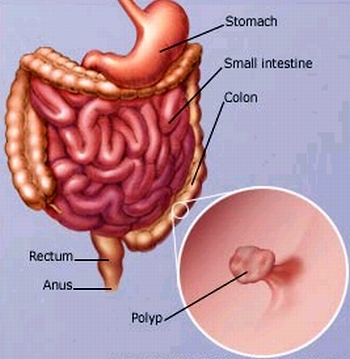Symptoms:
Colorectal Cancer in its early stages usually doesn’t cause any symptoms. Symptoms occur later, when the cancer may be more difficult to treat. The most common symptoms include:
* Pain in the belly.
* Blood in your stool or very dark stools.
* A change in your bowel habits (such as more frequent stools or a feeling that your bowels are not emptying completely).
* Fatigue.
* In rare cases, unexplained weight loss.
Colon cancer may cause no symptoms. When there are symptoms, they may depend on where in the colon the cancer is.
* The cecum and ascending colon, the first and second parts of the colon, are on the right side of your abdomen. Cancer in this area may bleed, causing blood in the stool and symptoms of anemia, including fatigue and weakness. The amount of blood may be small and so well mixed with stool that your stool may look normal. Sometimes cancer in this area does not cause many symptoms.
* The transverse colon, the third part, goes across your body from right to left. Cancer here may cause abdominal cramps.
* The descending colon, the fourth part, and the S-shaped sigmoid colon, the fifth part, are on the left side of your abdomen and join the rectum. Cancer here may cause narrower stools and bright red blood in the stool. Sometimes this blood is mistakenly thought to come from hemorrhoids.
Having these symptoms does not mean you have cancer. A number of other medical problems could cause similar symptoms, including:
* Irritable bowel syndrome, a common digestive problem that causes periods of stomach pain, cramping or bloating, and diarrhea or constipation.
* Other growths (polyps) in the large intestine that are not cancer.
* Diverticulitis, a condition in which pouches form in the wall of the colon and become painful, swollen, or infected.
* Infections that cause diarrhea, such as salmonella.
* Inflammatory bowel disease, such as Crohn’s disease and ulcerative colitis, which cause swelling and sores in the intestines.
* Bleeding hemorrhoids.
* Ulcers of the rectum.
 New study results strengthen the evidence that people who smoke cigarettes over a long period of time have an increased risk for developing colorectal cancer, even after adjusting for other risk factors.
New study results strengthen the evidence that people who smoke cigarettes over a long period of time have an increased risk for developing colorectal cancer, even after adjusting for other risk factors.
“This provides one more reason not to smoke, or to quit as soon as possible,” said senior author Michael J. Thun, M.D., M.S., vice president emeritus, epidemiology and surveillance research at the American Cancer Society. “Colorectal cancer should be added to the list of cancers caused by smoking.”
Findings are published in the December issue of Cancer Epidemiology, Biomarkers & Prevention, a journal of the American Association for Cancer Research, as part of a special focus on tobacco.
Thun and colleagues tested the association between long-term cigarette smoking and colorectal cancer after adjusting for multiple other factors that are generally associated with risk, including screening. From 1992 through 2005 the researchers followed almost 185,000 participants aged 50 to 74 years old; participants described their behaviors and medical conditions.
Participants who smoked cigarettes for 40 or more years, or who did not quit before age 40, had a 30 percent to 50 percent increased risk of developing colon or rectal cancer during the follow-up, even in analyses that adjusted for 13 other potential risk factors, according to Thun. After 13 years of follow-up, the researchers identified 1,962 cases of invasive colorectal cancer.
While previous large studies conducted in long-term smokers showed similar results, Thun stated that this study is the first to control for screening and all of the suspected risk factors for colorectal cancer, such as alcohol consumption, physical inactivity and consumption of red or processed meat.
“These findings contributed to the evidence recently reviewed by the International Agency for Research on Cancer (IARC) in October of this year,” Thun said. “IARC upgraded the evidence that smoking causes colorectal cancer from ‘limited’ to ‘sufficient’.”
This IARC reclassification brings the number of cancer organ sites causally related to cigarette use to 17, which includes cancers of the oral cavity, pharynx, nasopharynx, nasal cavity and paranasal sinuses, larynx, lung, esophagus (both squamous cell and adenocarcinoma), stomach, colorectum, liver, pancreas, kidney (both renal cell and transitional cell carcinoma), urinary bladder and lower urinary tract, uterine, cervix, and myeloid leukemia.
